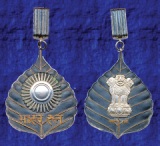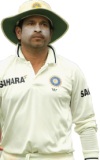Archives
Sachin Tendulkar India's enduring Hero
In test cricket alone Tendulkar’s 15,921 test runs remains at the top of the table as compared to 13,378 for Australian star Ricky Ponting and around 12000 by the maestro from West Indies Brian Lara.
|
Nothing official about it! Sachin’s son Arjun’s selection for Mumbai under 14 in January 2013 was highly controversial. The issue was perhaps raised because several deserving budding cricketers were denied chance. In 2006, Sachin was booed by fans at Wankhede Stadium in Mumbai after being dismissed for a low score in a test against England. Never before had he faced such an angry home crowd. What is even worse is that it happened to the ‘God’ in Mumbai. 2001 – He was suspended for one test by referee Mike Denness for not informing umpires he was cleaning the seam of the ball during the Port Elizabeth test against South Africa. Indian Board officials called it ‘apartheid’. 2007- Greg Chappell saga: Australian coach Chappell did not enjoy a good rapport with senior players. Greg complained that Indian seniors including Sachin were not showing the hunger for a fight. Slowly, once Sachin complained, Greg’s contract also ended. |
 A man so exceptionally gifted in the game that the entire cricketing fraternity – players, commentators and fans - remained wide - eyed in awe till his last innings at his
A man so exceptionally gifted in the game that the entire cricketing fraternity – players, commentators and fans - remained wide - eyed in awe till his last innings at his
|
Bharat Ratna challenged A case has been filed in a local court in Muzaffarpur in Bihar challenging the selection of Sachin Tendulkar for the Bharat Ratna and charging the Prime Minister and Union Home Minister with hurting the peoples’ sentiments. The case filed in the court of Chief Judicial Magistrate (CJM) S P Singh by local lawyer Sudhir Kumar Ojha said the selection of Sachin Tendulkar for the country’s highest civilian honour and not legendary hockey player Dhyanchand has hurt the sentiments of the people of the country. |
200th test match in Mumbai hat got under way to a glittering start on November 14, 2013. He looked on a good knick on the first day and scored 74 the next day.
Years back, he was crowned ‘God’ by the fans and so much was the aura that taking a break from the traditional outfit in order to pay tribute to one of the greatest
batsmen in the history of cricket, the Board of Control of Cricket in India (BCCI) had ‘Sachin Ramesh Tendulkar 200th Test’ embossed below the Board logo on the national team’s jersey.
As for Sachin himself and also for many others, it was hard to believe that his life on the 22 - yard cricket pitch over the past 24 years had come to an end.
His record of 200 matches, 329 innings, 15921 runs, 51 centuries, a 53.78 average in test cricket and 463 matches, 452 innings, 18426 runs, 49 centuries and a 44.83 average in one day matches itself speaks eloquently.
Role model
Apart from his stellar career, there were things off the field for his compatriots to cherish and talk about. M S Dhoni, the skipper of the Indian team, called him a role model while another former skipper Saurav Ganguly, whooften courted major controversies, said during his trouble - torn days with Australian coach Greg Chappel, “Sachin always stood by me”. “Everybody talks about his records, but the standard he set off the field was incredible. The standards he has set have been benchmarks for us. Whether he got a 100 or no runs, he would practice hard,” says Yuvraj Singh.
 Sachin Tendulkar scored more runs and posted more centuries in international cricket than anyone and thus could be only compared with the previously incomparable Sir Donald Bradman, the Australian legend who averaged almost a 100 per innings in his illustrious career. Besides a record 15,921 runs in 200 tests including the scintillating 74 on the last test braving the nail - biting excitement; Sachin’s 18,426 runs in 463 limited overs (one - day version of the game) will surely stand unconquered for a while.
Sachin Tendulkar scored more runs and posted more centuries in international cricket than anyone and thus could be only compared with the previously incomparable Sir Donald Bradman, the Australian legend who averaged almost a 100 per innings in his illustrious career. Besides a record 15,921 runs in 200 tests including the scintillating 74 on the last test braving the nail - biting excitement; Sachin’s 18,426 runs in 463 limited overs (one - day version of the game) will surely stand unconquered for a while.
While a piece in the ‘New York Times’ compared Tendulkar’s retirement from cricket to the death of Mahatma Gandhi in another highly superlative write up, ‘Wall Street Journal’ wrote, “In a land of chronic inefficiency, he was remorselessly efficient; in a land with a global inferiority complex, he was the best in the world; in a land where public figures are strutting peacocks, he was often a picture of painful humility; in a land that thirsts for self - respect, Sachin spelled pride.”
While the master blaster, as he was called by the media, would be known from the cricketing point of view for his compact defence and immaculate drives, Denis Lily, who once declined to coach Sachin as a bowler, later said, “If I have to bowl to Sachin I better put on my helmet”.
Sachin will also go down the pages of history as a player who had a special appetite for performing well against Australia. Among the noticeable innings, he had made 114 on a fiery test pitch at Perth in 1991 - 92 when he was still in his teens; a 241 not out at Sydney in a rare series drawn in Australia in 2003 - 04; and 155 not out in the Chennai Test of 1997 - 98. Records also show that his master blaster sparkled frequently against Australian bowling greats Glenn McGrath and Shane Warne.
Brand Sachin!
Sachin had other striking features especially off the field. Therefore on November 16, 2013, as he walked away from the Wankhede Stadium after an emotional speech, punters also wondered what happens to Brand Tendulkar now that he’s walked off the ground. There is already debate on which few endorsements he could still continue to hold. But then came in the Bharat Ratna from the UPA government and hence a debate in social networking sites - Should the winner of country’s highest civilian award subject himself to commercial exploitation?
But as blogger Ashraf Engineer says, Sachin had his commercial fortune with the timing of national history. “The timing of his entry into the Indian consciousness coincided with the economic – and resultant social – awakening of India. As India grew, so did the Tendulkar legend. His exploits seemed in lockstep with the trail India itself was blazing. Coming as he did from a middleclass background, India identified with him even as his achievements raised the aspiration standards. He was the enduring hero in a country that sorely lacked one,” he says.
Can this fable be revisited?
The interpretation of one’s early life, childhood days and dreams definitely indicate the future of a man. In some cases, like that of irreplaceable Sachin Tendulkar, the stories of early life, have today turned into sweet memories for the nation and his countless fans. The pages can be hardly revisited and the fables not retold!
Known once as a bully in his early life vulnerable to taking on quarrels, Sachin took up cricket at the age of 11 when his brother Ajit (older by 10 years) introduced him to Ramakant Achrekar, a famous cricket coach of his time at Mumbai’s historic Shivaji Park, Dadar area.
Someone who had almost idolized John McEnroe and fascination for tennis, Sachin could not impress the coach in the first encounter. But Ajit was determined as he thought Sachin could excel in cricket and also that it would prevent him from taking on fights in the school and locality. Achrekar agreed and in the second opportunity, Sachin did leave his mark in the coach’s mind.
An eye with the farsightedness to spot a talent, Achrekar advised Sachin to shift his schooling to Dadar’s Sharadashram Vidyamandir English High School which had a dominant cricket team. Later years, Sachin consistently featured in his school team in local tournaments and also joined a cricket club, John Bright Cricket Club. Therefore, it was not without good reason that in his farewell speech at Wankhede on November 16, Sachin waxed eloquently about his brother, “We have lived this dream together. He was the one who sacrificed his career for my cricket. He spotted the spark in me.”
In the emotional outburst that he made and which left the jam-packed audience at Wankhede and millions others across the globe who sat glued before television sets teary eyed, Sachin was equally genuine when he paid tribute to his guru, Achrekar. “On a lighter note, in the last 29 years, sir has never ever said ‘well played’ to me because he thought I would get complacent and I would stop working hard. Maybe he can push his luck and wish me well done on my career now, because there are no more matches, sir, in my life,” the lines left scores of eyes wrapped in moist.
The master blaster’s sentimental accolades for the BCCI and his pride to represent India were also touching. “The dream was obviously to play for India, and that is where my association with BCCI started. BCCI was fantastic, right from my debut they believed in my ability … things would have been different if you had not been behind me”.

